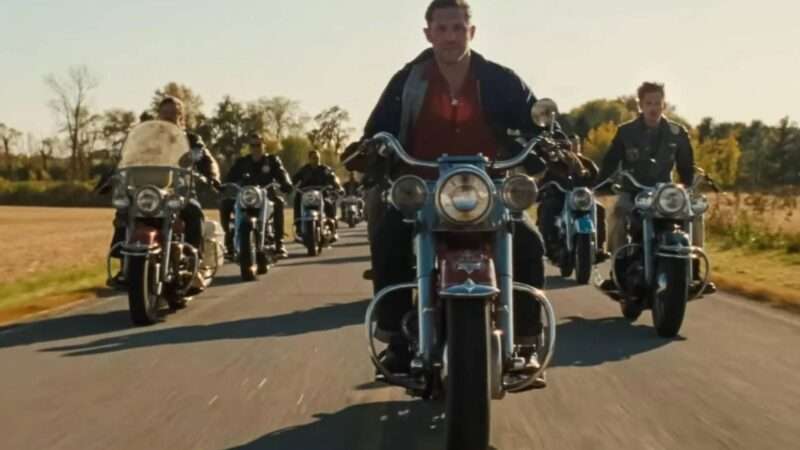
On one level, The Bikeriders is a movie about a Midwest motorcycle club, the Chicago Vandals, in the late 1960s and the early 1970s, as it grows and expands and eventually loses its way. But step back a bit and it's easy to see the film as a referendum on American counterculture and radical outsider movements more generally: In the movie's tragic vision, these movements start as something pure and communal and free of the pathologies of the wider world. But eventually, as they grow, they become ugly, empty, cynical, and cruel, torn apart by power struggles and depravity. Enjoy the good things while they last.
Fortunately, The Bikeriders is mostly a good thing, a star-driven adult drama with something to say about the American experiment, its ideals, and its relentless expansion and churn. I say mostly because the film is both too simplistic in its nostalgic worldview and too weak in narrative drive. But it's nicely shot and well-acted throughout, with a top-notch cast that delivers fine work even when the script doesn't give them quite enough to do.
Written and directed by Jeff Nichols based on a book by photographer Danny Lyon, The Bikeriders follows the birth and rise to prominence of the Vandals M.C., a Chicago-area motorcycle club based on the real-life Outlaws M.C.. The gang starts as a small, homespun project masterminded by Johnny (Tom Hardy), the group's gruff, decisive, slick-haired default leader. Not only did Johnny come up with the idea after watching a Marlon Brando movie, but he rose to the top because he was the only one willing to accept the responsibility and make and enforce the club's rules.
That's important, because when the club starts, the main thing that brings its members together, besides a shared love of motorcycles, is an ornery resistance to laws and rules. There's an anarchic spirit running through the gang, a refusal to fit into the social order: This tendency could sometimes be destructive, leading to drunken brawling, police chases, and a fair amount of disorderly conduct. But there were lines they wouldn't cross, and the movie portrays the gang's early period as essentially admirable. In their formative years, the Vandals do commit some crimes. But they are not a criminal gang so much as a brotherhood of weirdos and renegades with a deep-rooted inability to fit into conventional society.
The problems start when the club begins to expand, first with new local members and later with a network of chapters whose ranks are filled by men who have different tendencies. They view the club's rules as sacred and inflexible, rather than as useful tools for corralling miscreants, and they are more likely to engage in serious criminality and harder drug use. They too are rebels, but they are rebels against the rebellion.
Thus, Johnny finds himself struggling to keep the club under control and he's looking for a way out. He needs a successor and he has his eye on Benny (Austin Butler), a handsome, charismatic young biker with a cool attitude and a deep love of the club. Benny is the club's soul, its spirit animal, a symbol of its ethos and character, but he's resistant to any sort of real responsibility. Benny is married to Kathy (Jodie Comer), whose narration—delivered to a character based on Lyon (Mike Faist)—organizes the movie. She talks viewers through the club's crew of motley characters, which include finely crafted small turns from Michael Shannon, Norman Reedus, and Boyd Holbrook, and explains milestone events and time jumps in the narrative.
But somewhat frustratingly, she never quite explains her own husband. As Benny, Butler is a moody and charismatic screen presence, and you can see him blossoming into a major star. But after he sustains an injury early in the film, his character is left adrift with little to do except smoke and drink and glower beautifully, which, admittedly, he does quite well. But his passivity means it's never quite clear what motivates him, what he wants from life, from the club—except to ride with his boys and live free of the world's rules and expectations. Ah, freedom.
Maybe that's the point. But when the club's inevitable internal revolution comes at the hands of an angry, violent newcomer from a younger, harder generation, Benny's taciturn character doesn't have the drive to push back. He just watches, smoking and glowering as beautifully as ever, as his world leaves him behind.
That, in turn, means the movie never moves beyond simple nostalgia and never complicates its beautiful-dream-to-cynical-enterprise story. It's more of a wistful look back at a carefree moment than a real reckoning with the legacy of a club that would, over time, become a violent, sprawling criminal enterprise. But it's well-acted and pleasing to look at, and that's enough to make it worth going along for the ride.
The post <i>The Bikeriders</i> Is a Nostalgic Vision of America's Postwar Counterculture appeared first on Reason.com.







